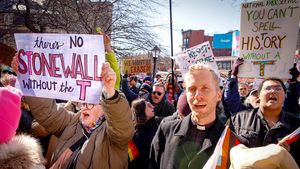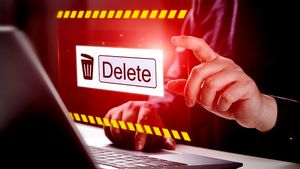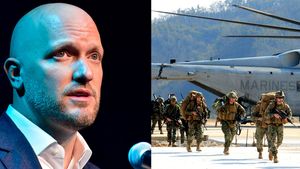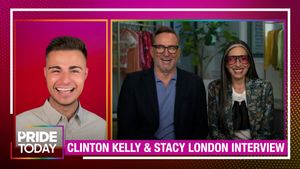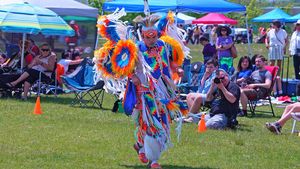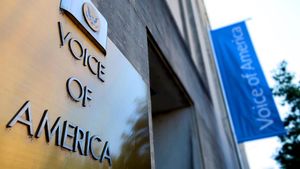MikelleStreet
CONTACTAbout UsCAREER OPPORTUNITIESADVERTISE WITH USPRIVACY POLICYPRIVACY PREFERENCESTERMS OF USELEGAL NOTICE
© 2025 Pride Publishing Inc.
All Rights reserved
All Rights reserved
Scroll To Top










By continuing to use our site, you agree to our Private Policy and Terms of Use.
Arrested Movement Series Addresses Male Body Positivity One Nude at a Time

Over the past decade 'body-positivity' has become a major cultural conversation, spawning a linked body-positive movement. People have discussed not only how important representation is, but how images in media impact self-image and by extension mental health. And while much of the mainstream conversations around body-positivity are centered on the bodies of women -- which are more commodified and undoubtedly also much more visible -- there's an important conversation to have around men's bodies. This conversation is even more important in the conversations of gay, and otherwise queer men.
In his ongoing multipart project Arrested Movement, photographer Anthony Patrick Manieri hopes to move the needle on body image awareness around the male form. With a history of work in fashion and portrait photography, Manieri set to create an inclusive awareness initiative and portrait series that celebrates and promotes positive body image for men. that inclusion is not only race, but body shape and type, gender and sexuality, age, and more. As he revealed in our interview though, while he has seen the impacts of the project on those he has shot, he's also felt a difference internally as well.
Here we speak to Anthony Patrick Manieri about the intent of Arrested Movement, the impact of mainstream 'body ideals,' and what's next. These questions are accompanied by a small selection of his work from the series.
What was the impetus for this project?

The topic of body positivity isn't gender-specific, unlike how the majority of media covers this, with most accumulated statistics focusing on women. Men feel too. Men need to be included in the conversation that's being had. That was the impetus for this project. We all need to be seen and heard, so finding models who were diverse and keeping intersectionality in mind as far as the male gender goes was important for helping people feel represented. A large part of body positivity has to do with mental health, and the consistent lack of diverse male body representation in the media and social media is creating a true epidemic.
What's your eventual goal for it?

Arrested Movement was always meant to be an artistic project, highlighting the beauty of diverse male bodies while bringing awareness of body positivity surrounding men. The objective is to have a series of gallery shows partnered with a book release, which will feature selected images and (re)launch in 2021. My team has also been focusing on bringing this to the screen, seeking out a production company that can help us create a documentary or docu-series focused on male body image. From there, I also want to launch a podcast, as well as create a men's retreat focusing on mental health and self-empowerment. And recently, I have been talking to illustrators (and still avidly looking for more illustrators for this project) within the LGBTQ+ community, collaborating on creating a series of illustrations based on selected Arrested Movement portraits, interpreting these images in their own artistic way. The goal here is to keep advancing the message and conversation of body positivity for men and meeting people where they are.
Can you explain your casting process?

I'm always grateful every time men show up and want to participate. I never really had a casting process. I usually just place a couple of posts on some LGBTQ+ social media pages and wait for a response. I tend to accept participants on a first-come, first-served basis as per men emailing and confirming that they would indeed like to be involved in a portrait session. I did this purposefully because I didn't want to be discerning with casting. If someone felt comfortable enough to participate in this series and help promote positive body image, I wanted to include and honour them.
Once things started to snowball, I noticed that it was mostly white, Latino and European men that were mostly interested in participating. I made it a point that any men of colour or men with any disabilities that were interested were definitely included in the sessions as best as I could, even if they reached out in the 11th hour. I'm not sure if it's a cultural stigma, but for some reason men from these demographics are not as keen to participate. So I started to make a point to message individual men on social media asking if they would be interested in participating, to try and make sure there was as much proper representation as possible, not just with diverse bodies, but with identity as well.
Do mainstream ideas about what bodies are 'appropriate' to be seen nude impact who is comfortable to be shot by you and if so how do you combat that?

Yes, absolutely. I found that was the case more so in the beginning. But since the series has grown in popularity, more and more men with diverse body types are willing to step forward, which is amazing. I combat these concerns from men of uncomfortableness by simply being empathically human. Everyone is on a journey with themselves, and I'm no different regarding body positivity, as I posed for this series as well. I assure them that the images are tasteful, artistic, and hopefully it will be a great experience for them, as well as creating strong representation for others.
Was there an early moment during the process that you realized this work was really important?

I had a few of those moments actually. From men who reached out thanking me for creating this platform of representation and/or sharing their own stories and struggles with me. Everyone has a story. Everyone is on their own journey. But there was one man in particular that stood out for me. He pulled me aside on set, and opened up about his story, sharing his numerous personal medical conditions, and said that he wanted to participate in this series to make sure that there was proof that he existed in this world. I gave him a big hug when we were done, and I excused myself and went outside and cried. It's with great intention that the message of this series was heard and understood, but that moment shook me. And it definitely fuelled something in me, validating what I was doing had great purpose.
How has shooting this project impacted you?

This journey of producing the Arrested Movement series/project has transformed the way I look and treat myself, as well as how I see my fellow man. The act of self-acceptance and self-love is something that I work on daily. I've always suffered from poor body image as a younger man, and that's just something that has been ingrained in my psyche by my own doing. What I've come to know while on this journey, through all the wonderful men I've had the pleasure of meeting and working with, as well as the conversations I've had whether in person or through messaging, is that we are not alone in our thoughts and feelings. Our own insecurities are not singular in this world. The regular media and the juggernaut of social media has created such detachment from ourselves with our fellow man and the universe itself, when in fact, we are indeed all one, and we forget that we are all connected energetically. And I hope this series helps people begin to remember this.




Latest Stories
Ranking the highest-earning queens in 'RuPaul's Drag Race' herstory
May 09 2025 4:04 PM
Proud parents: Celebs who love and support their LGBTQ+ kids
May 02 2025 8:57 AM
New 'Boys! Boys! Boys!' podcast explores queer art and identity
May 02 2025 8:19 AM
29 of the dozens of lesbian cops in TV & movies
April 26 2025 5:41 PM
Every finalist queen on 'RuPaul's Drag Race' and their track records
April 21 2025 10:06 AM
'RuPaul's Drag Race All Stars' winners and finalists (with track records!)
April 18 2025 10:04 AM
29 out & proud LGBTQ+ country artists you should be listening to
April 15 2025 3:21 PM
No closets here! Watch these LGBTQ+ films where no one has to come out
April 09 2025 5:04 PM
No Pride flags needed in French Polynesia
April 07 2025 11:16 AM
Out and About with Karan Soni
April 04 2025 10:00 AM
Pedro Pascal is aging like a fine wine — as proven by these 32 pics
April 02 2025 11:22 PM
Jane Hilton's 'Cowboys & Queens' explores the modern American dream
March 28 2025 6:31 PM
8 of Jonathan Groff's best (and most iconic) gay roles
March 26 2025 1:58 PM
27 LGBTQ+ reality dating shows & where to watch them
March 24 2025 11:32 AM
All the 'Drag Race' queens on OnlyFans (& what they're showing)
March 21 2025 10:57 AM
48 steamy celebrity Calvin Klein ads the gays won't forget
March 17 2025 5:42 PM
Trending stories
Recommended Stories for You
Mikelle Street
Mikelle is the former editorial director of digital for PrideMedia, guiding digital editorial and social across Out, The Advocate, Pride.com, Out Traveler, and Plus. After starting as a freelancer for Out in 2013, he joined the staff as Senior Editor working across print and digital in 2018. In early 2021 he became Out's digital director, marking a pivot to content that centered queer and trans stories and figures, exclusively. In September 2021, he was promoted to editorial director of PrideMedia. He has written cover stories on Ricky Martin, Miss Fame, Nyle DiMarco, Jeremy O. Harris, Law Roach, and Symone.
Mikelle is the former editorial director of digital for PrideMedia, guiding digital editorial and social across Out, The Advocate, Pride.com, Out Traveler, and Plus. After starting as a freelancer for Out in 2013, he joined the staff as Senior Editor working across print and digital in 2018. In early 2021 he became Out's digital director, marking a pivot to content that centered queer and trans stories and figures, exclusively. In September 2021, he was promoted to editorial director of PrideMedia. He has written cover stories on Ricky Martin, Miss Fame, Nyle DiMarco, Jeremy O. Harris, Law Roach, and Symone.













































